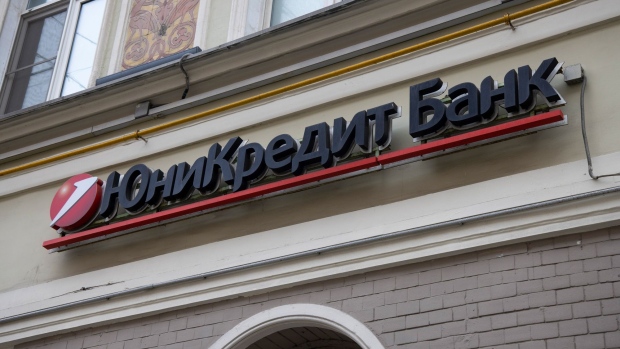May 27, 2022
Russia Restricts Local Operations for Italy’s UniCredit, Intesa
, Bloomberg News

(Bloomberg) -- Russia’s central bank has imposed a new temporary round of restrictions affecting Italian companies, consulates and citizens with accounts at local units of lenders UniCredit SpA and Intesa Sanpaolo SpA, people with knowledge of the matter said.
The lenders received letters from the central bank stating that from May 25 for a period of one year, Italian individuals and firms with accounts at the two lenders’ Russian units cannot withdraw funds without permission from their local management. Those individuals and companies will be barred from opening new accounts, according to the people, who asked not to be named discussing confidential information.
The central bank also limited the size of cash transfers for accounts exceeding 100,000 euros ($107,360) or the equivalent in other currencies, including those used for Italian consular operations, the people said, adding that there will be an exemption for Italian citizens with Russian residency permits.
Representatives for the central bank didn’t respond to a request for comment. Spokespeople for UniCredit and Intesa declined to comment.
Escalating Measures
Since the Russian invasion of Ukraine, the Moscow-based central bank has taken a series of escalating measures to limit foreign companies’ operations, in a bid to counter US and European sanctions.
Shortly after the outbreak of the war, the bank imposed strict limits on foreign exchange operations to halt a sharp drop in the ruble. Foreign investors can also no longer trade Russian stocks and bonds in Russia, and the authorities are reportedly weighing measures to punish international companies pulling out of the country.
The new curbs focused on the two Italian lenders have already affected consular operations, the country’s embassy in Moscow said. The restrictions make it impossible to collect service fees, the embassy said, meaning that visa applications will only be considered if they’ve already been paid for, or in cases where no payment is required.
UniCredit, whose operations in Russia include some 4,000 employees and 1,500 corporate clients, took charges totaling almost 2 billion euros on its business in the country in the first quarter.
Intesa, whose presence is more limited, has about 4 billion euros in credit exposure to Russia after booking 800 million euros in impairments linked to business in the country. Both banks have said they’re seeking to further cut their exposure to Russia as sanctions have made finding a buyer for local units challenging.
©2022 Bloomberg L.P.